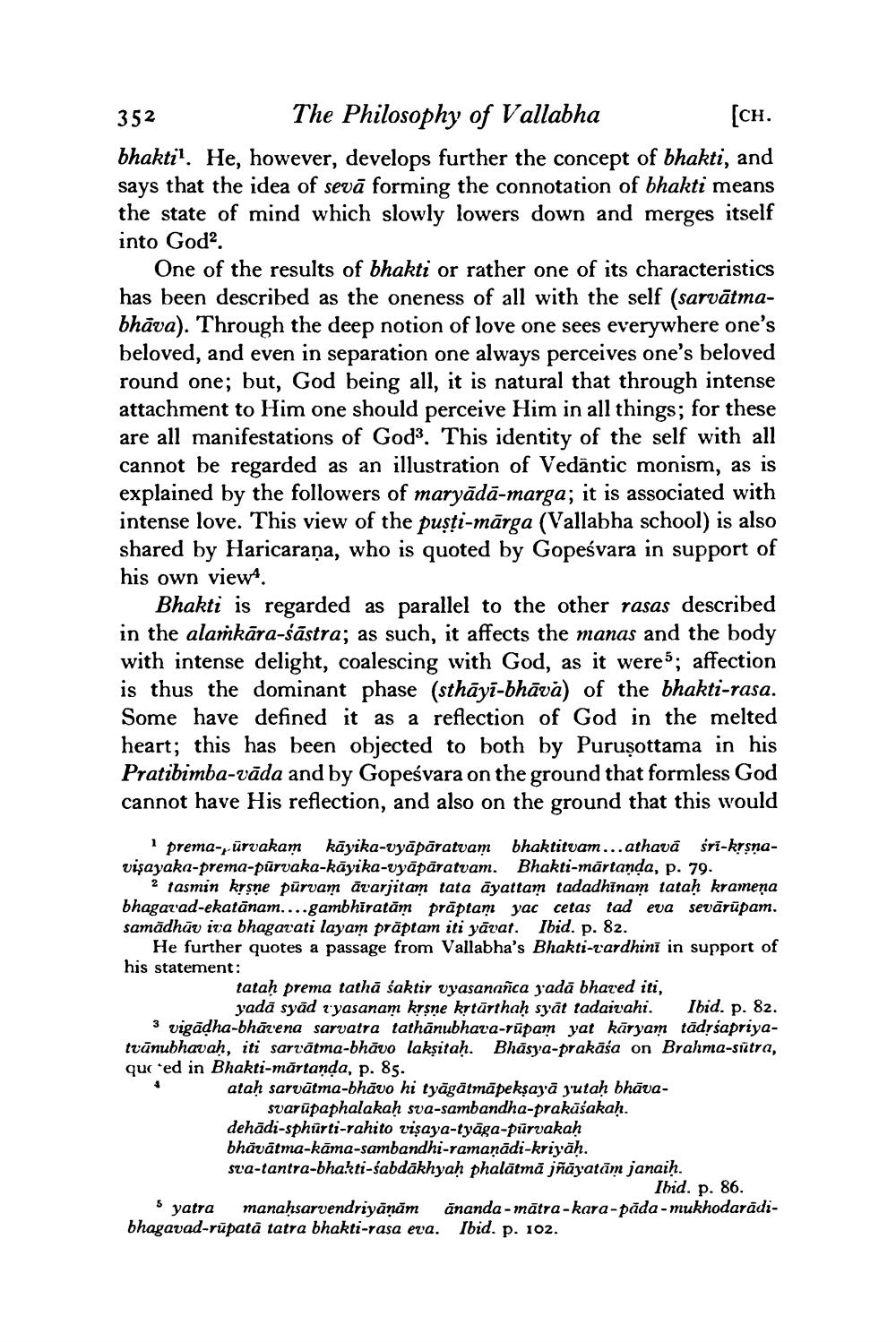________________
352 The Philosophy of Vallabha
[CH. bhaktil. He, however, develops further the concept of bhakti, and says that the idea of sevā forming the connotation of bhakti means the state of mind which slowly lowers down and merges itself into God?
One of the results of bhakti or rather one of its characteristics has been described as the oneness of all with the self (sarvātmabhāva). Through the deep notion of love one sees everywhere one's beloved, and even in separation one always perceives one's beloved round one; but, God being all, it is natural that through intense attachment to Him one should perceive Him in all things; for these are all manifestations of Gods. This identity of the self with all cannot be regarded as an illustration of Vedāntic monism, as is explained by the followers of maryādā-marga; it is associated with intense love. This view of the pusți-mārga (Vallabha school) is also shared by Haricaraṇa, who is quoted by Gopeśvara in support of his own views.
Bhakti is regarded as parallel to the other rasas described in the alamkāra-śāstra; as such, it affects the manas and the body with intense delight, coalescing with God, as it weres; affection is thus the dominant phase (sthāyī-bhāvā) of the bhakti-rasa. Some have defined it as a reflection of God in the melted heart; this has been objected to both by Puruşottama in his Pratibimba-vāda and by Gopeśvara on the ground that formless God cannot have His reflection, and also on the ground that this would
prema-yurvakam kāyika-vyāpāratvam bhaktitvam...athava sri-krsnavisayaka-prema-pūrvaka-kāyika-vyāpāratvam. Bhakti-mārtanda, p. 79.
2 tasmin krsne pūrvam ārarjitam tata ayattam tadadhinam tataḥ kramena bhagatad-ekatānam....gambhiratām prāptam yac cetas tad eva sevārūpam. samadhūv ita bhagavati layam prāptam iti yāvat. Ibid. p. 82.
He further quotes a passage from Vallabha's Bhakti-tardhini in support of his statement:
tatah prema tathā Śaktir vyasanañca yadā bhared iti,
yadā syād 2 yasanam krsne krtūrthaḥ syāt tadaivahi. Ibid. p. 82. 3 vigādha-bhāvena sarvatra tathānubhava-rūpam yat kāryam tādīšapriyatvānubhavah, iti sarrātma-bhāvo lakṣitaḥ. Bhäsya-prakāśa on Brahma-sútra, que ed in Bhakti-mărtanda, p. 85.
ataḥ sarvātma-bhāvo hi tyāgātmāpekṣayā jutah bhāva
svarūpaphalakah sua-sambandha-prakāśakah. dehādi-sphurti-rahito visaya-tyāga-pürvakah bhāvātma-kama-sambandhi-ramaņādi-kriyah. st'a-tantra-bhakti-sabdakhyaḥ phalātmā jñāyatām janaih.
Ibid. p. 86. s yatra manaḥsarvendriyānām ānanda - mātra-kara-păda-mukhodarādibhagavad-rüpata tatra bhakti-rasa eva. Ibid. p. 102.




